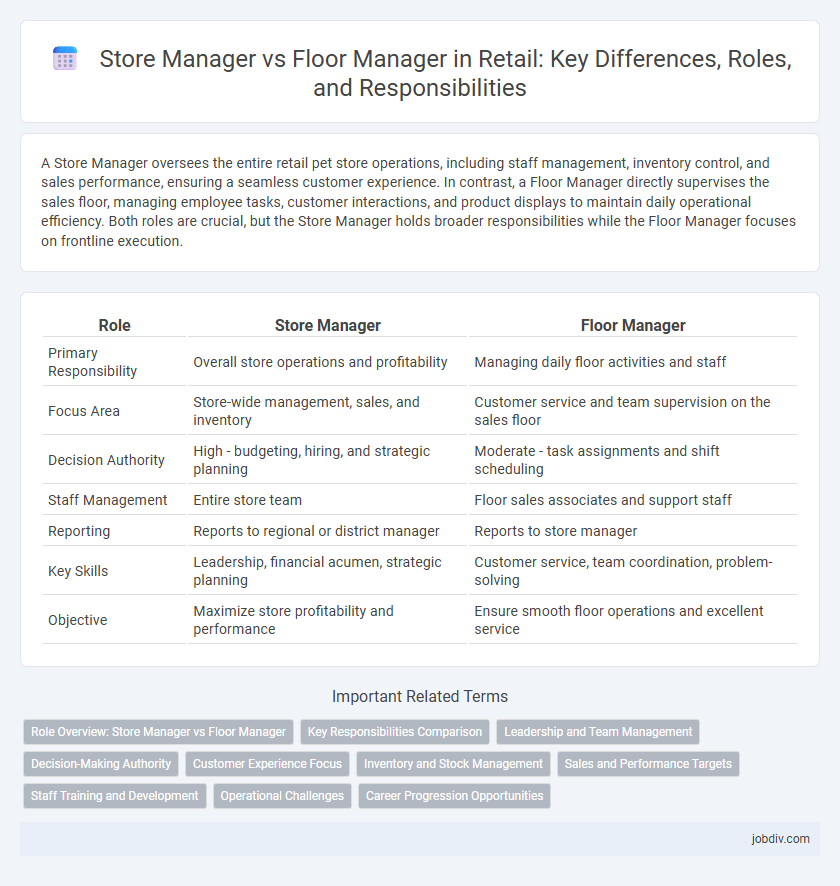A Store Manager oversees the entire retail pet store operations, including staff management, inventory control, and sales performance, ensuring a seamless customer experience. In contrast, a Floor Manager directly supervises the sales floor, managing employee tasks, customer interactions, and product displays to maintain daily operational efficiency. Both roles are crucial, but the Store Manager holds broader responsibilities while the Floor Manager focuses on frontline execution.
Table of Comparison
| Role | Store Manager | Floor Manager |
|---|---|---|
| Primary Responsibility | Overall store operations and profitability | Managing daily floor activities and staff |
| Focus Area | Store-wide management, sales, and inventory | Customer service and team supervision on the sales floor |
| Decision Authority | High - budgeting, hiring, and strategic planning | Moderate - task assignments and shift scheduling |
| Staff Management | Entire store team | Floor sales associates and support staff |
| Reporting | Reports to regional or district manager | Reports to store manager |
| Key Skills | Leadership, financial acumen, strategic planning | Customer service, team coordination, problem-solving |
| Objective | Maximize store profitability and performance | Ensure smooth floor operations and excellent service |
Role Overview: Store Manager vs Floor Manager
The Store Manager oversees overall store operations, including sales performance, staff management, and inventory control, ensuring alignment with corporate goals. The Floor Manager focuses on the customer experience by supervising daily floor activities, staff interactions, and merchandising standards. Both roles collaborate closely to maintain store efficiency and optimize sales outcomes.
Key Responsibilities Comparison
Store managers oversee overall retail operations, including staff management, inventory control, sales strategy implementation, and financial performance analysis. Floor managers focus on day-to-day customer service, staff scheduling, merchandising, and ensuring a smooth shopping experience on the sales floor. Key responsibilities differ as store managers drive strategic goals and operational policies, while floor managers handle tactical execution and team supervision on-site.
Leadership and Team Management
Store Managers oversee overall retail operations, ensuring business goals are met through strategic leadership, inventory control, and customer satisfaction. Floor Managers focus on supervising sales associates, managing daily floor activities, and maintaining team morale to optimize customer service and sales performance. Both roles require strong communication skills and the ability to motivate teams, but Store Managers have broader responsibilities including financial management and long-term planning.
Decision-Making Authority
Store Managers hold comprehensive decision-making authority, overseeing overall store operations including staffing, budgeting, and inventory control. Floor Managers have more limited decision-making power, primarily focused on managing sales floor activities, customer service, and staff supervision during shifts. The Store Manager's role centers on strategic and financial decisions, while the Floor Manager executes day-to-day operational choices within established guidelines.
Customer Experience Focus
Store Managers oversee overall operations, ensuring seamless integration of all departments to enhance the customer journey. Floor Managers concentrate on real-time customer interactions and staff coordination on the sales floor to maintain high service standards. Both roles collaborate to optimize customer satisfaction and drive sales performance in retail environments.
Inventory and Stock Management
Store managers oversee overall inventory strategies, including stock replenishment cycles, supplier coordination, and loss prevention policies to ensure optimal product availability and minimize shrinkage. Floor managers focus on real-time stock management, conducting regular shelf audits, managing backstock organization, and addressing immediate restocking needs to maintain a seamless customer experience. Effective collaboration between store and floor managers streamlines inventory accuracy, reduces stockouts, and enhances operational efficiency in retail environments.
Sales and Performance Targets
Store managers are responsible for overall sales performance, setting targets, and ensuring that the entire retail environment meets company goals. Floor managers focus on executing daily operations, managing staff workflow, and directly influencing sales through customer engagement and merchandising. Both roles are critical for achieving sales targets, with store managers driving strategic performance and floor managers optimizing on-the-ground execution.
Staff Training and Development
Store Managers oversee comprehensive staff training and development programs, ensuring alignment with company goals and enhancing overall team performance. Floor Managers concentrate on hands-on coaching and immediate skill-building for sales associates, addressing daily operational challenges. Effective collaboration between Store and Floor Managers fosters continuous employee growth and improves customer service quality.
Operational Challenges
Store Managers face operational challenges such as overall inventory control, staff scheduling, and ensuring compliance with company policies, requiring strategic oversight of multiple departments. Floor Managers focus more on real-time customer service management, product placement, and addressing immediate staff or customer issues on the sales floor. Balancing these responsibilities demands effective communication and coordination to maintain seamless retail operations.
Career Progression Opportunities
Store Managers typically have broader career progression opportunities, advancing to regional or district management roles due to their comprehensive responsibility over store operations, budgeting, and team leadership. Floor Managers often progress to Store Manager positions by gaining experience in customer service oversight, staff scheduling, and merchandising execution, which are critical for managing entire store performance. Career growth in retail management favors those who demonstrate strategic planning, operational excellence, and the ability to lead diverse teams effectively.
Store Manager vs Floor Manager Infographic

 jobdiv.com
jobdiv.com